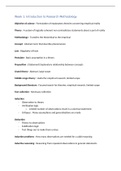Resume
Summary Social Research Methodology glossary
- Cours
- Établissement
- Book
This document contains an extensive glossary of all the terms that you are required to know for the Social Research Methodology exam. It is complete, well-organized, and easy to read.
[Montrer plus]




